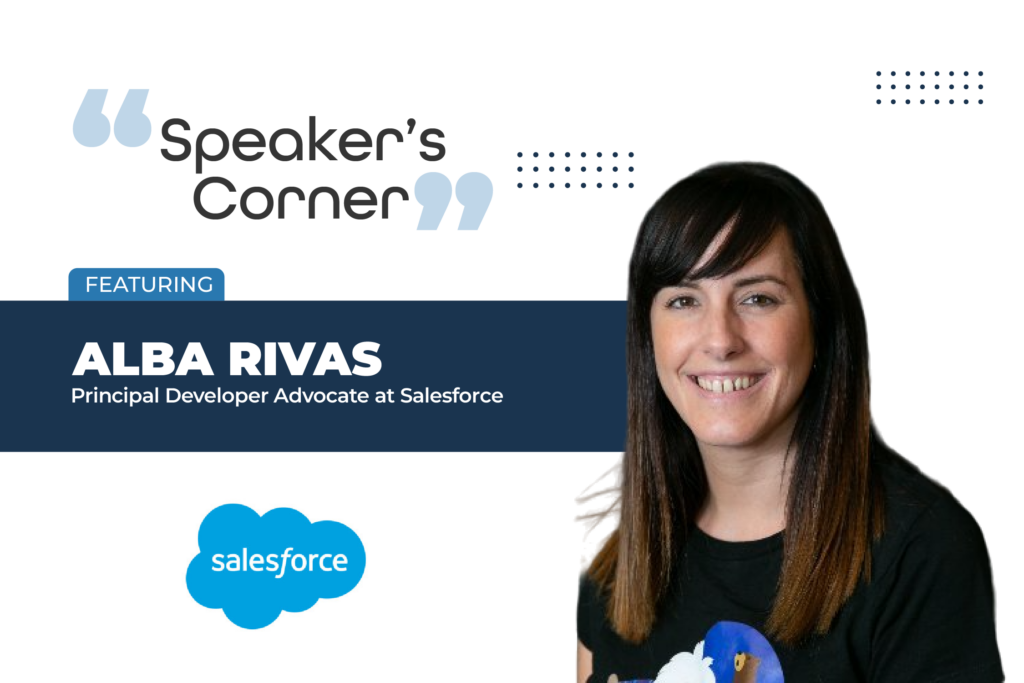
Alba Rivas, a Principal Developer Advocate at Salesforce, is deeply passionate about coding, continuous learning, and knowledge sharing. Recognized as a Salesforce MVP for three consecutive years, she has also contributed her expertise as a coach for RAD Women on multiple occasions. Alba played a pivotal role as one of the founders of dreamOlé, a community-driven event in Spain.
In her latest interview with Eventible, she talks about her journey so far, her inspiration behind joining Salesforce as a Principal Developer Advocate, her experience speaking at Conf42, and more! Read along for the full interview.
- Please share a bit about your journey and how you became involved in developer advocacy, particularly in the context of Salesforce.
I studied telecommunication engineering and spent my first working years developing apps in different programming languages. Because I knew object-oriented languages, I was hired to become a Salesforce developer with a partner. When I started to play with Salesforce, I immediately loved its technologies and ecosystem. On top of being a developer for the company, because I wanted to improve my skills, in my free time, I started to learn and experiment with Salesforce a lot. I then thought that it could be interesting for others to know about my findings, and I started to share them publicly: I created a personal blog in which I talked about Salesforce development, started to give talks at conferences, presenting what I had been investigating, and also became part of the Salesforce Trailblazer Community. I became the leader of the Granada Developer Group (in “meetup” at that time), and I eventually became a Salesforce MVP (a recognition that the company gives to community members who inspire, contribute, and share). At that point, I was doing what a developer advocate does, but I was using my free time for that. So, when a developer advocate position opened at Salesforce, I didn’t hesitate to apply. It was a natural evolution for me.
- What inspired you to join Salesforce as a Principal Developer Advocate, and what do you find most fulfilling about this role?
First, I spend a big portion of my time programming and trying out new developer features – which is what I was doing before in my free time! Programming on the Salesforce platform is fun. Because your Salesforce apps run in a multitenant environment in the cloud, you’re forced to write very performant back-end code or even implement async architectures (in Apex) so your app doesn’t hoard resources and doesn’t hit the limits. For the front end, you write web components using an open-source framework (Lightning Web Components) that’s very well integrated with the platform and that forces you to learn and stay up to date with HTML, JavaScript, and CSS. On top of that, Salesforce is a very innovative company that’s constantly evolving and releasing new features. I never get bored! Second, I love teaching and sharing. There’s nothing more fulfilling than receiving a message from somebody who found your content useful. Sometimes, people even write to me saying they were able to find a job after learning about my content. That’s one of the best things that can happen to you as an advocate. And third, I love being part of the Salesforce community, a big family in which everybody helps and supports each other, shares knowledge, and has fun.
- What strategies do you employ as a Principal Developer Advocate to communicate complex technical concepts effectively to developers and stakeholders?
The simpler, the better. I try to use simple language, making sure I am using words everybody can understand (especially those whose mother tongue is not English, like me). I try to start from scratch and not assume people have knowledge of the feature or topic, so even beginners can grasp it. I also try to explain what’s under the hood, how a feature has been implemented behind the scenes, and why it’s been done that way. This gives context and helps understand and reinforce concepts.
- Salesforce offers a wide range of products and services. Please highlight some key developer-focused initiatives or tools that Salesforce provides to support developers.
There are three pillar technologies for devs that Salesforce is constantly evolving: the Apex language, the Lightning Web Components (LWC) framework, and the developer tooling. The Salesforce developer experience has changed drastically in the last eight years, as we now have a super powerful CLI plus a pack of IDE extensions that make it easier and much more pleasant to develop Salesforce apps. Additionally, it is worth highlighting Salesforce recently released Einstein for Developers (a code generation assistant tool for Apex and LWC), Code Analyser (a tool for static and graph-based code analysis for Apex and LWC), and ApexGuru (a tool that is able to find non-performant code by exploring execution logs with AI).
Salesforce is also investing heavily in AI and data. Of course, developers can do a lot with the new AI and Data features, as they are fully integrated with the platform and available for developers to use in their custom apps. For instance, you can build your own custom generative AI apps using the power of Einstein Copilot, Prompt Builder, or Data Cloud APIs.
- How do you stay updated with the latest trends and developments in the technology industry, and how do you incorporate this knowledge into your advocacy efforts for Salesforce?
I am subscribed to several blogs, newsletters, magazines, and video channels, that I review with a cadence. Also, I try to attend or watch developer conferences (such as conf42), which are a great opportunity to learn by listening to talks and panels and, of course, to talk to other devs! I always try to advocate these new trends and best practices in the Salesforce developer community. For instance, implementing new JavaScript features or syntax in our sample apps or creating specific content about what has changed so everybody is up to date.
- Can you share some examples of successful developer-focused campaigns or initiatives that you’ve been involved in at Salesforce and what the outcomes were?
One recent program I’ve been involved in is Journey to Salesforce, a free online program for individuals who are new to the Salesforce ecosystem that provides essential skills and knowledge through self-paced educational content, a supportive community, and mentorship opportunities. Concretely, I was the creator of the content path. We are piloting this program in India, the US, and Canada, and it’s been really successful, as developers have a simple and fun way to get started in the Salesforce ecosystem and grasp the technologies that are used.
- What are some common challenges that developers face when working with Salesforce platforms, and how does Salesforce support developers in overcoming these challenges?
Salesforce development has some unique characteristics that developers must learn. Luckily, there are a ton of resources available to make it easy for you. For instance, all the content that my team produces is in the form of sample apps (GitHub), videos, blogs, and podcasts. We also have Trailhead, a gamified learning platform; the Trailblazer Community, an online digital community to ask questions and network; and the Trailblazer Community Groups, which meet in person to learn, share, and network all over the globe.
- With APIs and integrations becoming increasingly important in modern software development, how does Salesforce empower developers to build seamless integrations with other systems?
Salesforce is an API-first company. Indeed, when you create an object in the database, it’s automatically exposed through all the different APIs. We have a strong partnership with Postman, and our Salesforce Platform collection, with 250+ examples, is Postman’s most popular one. We also have collections for many other products and clouds (Tableau, Marketing Cloud, etc.).
- Collaboration and community engagement are often crucial in developer advocacy. How does Salesforce foster a vibrant developer community, and how do you nurture it?
A community for us is all. Luckily, Salesforce has a very strong community program, of which I was part before as an employee, that recognizes and empowers individuals who become part of it. We call it the “ohana,” which means family in Hawaiian. As a developer advocate, I am in constant bidirectional contact with the developer community. First, I help spread the word about the latest developer features so that the community can understand and use them. Second, I help the community voice to be heard, helping feedback arrive at the right product manager or Salesforce employee.
- How was your experience at Conf42, and what was your biggest takeaway?
I participated in Conf42 twice in 2022 for the Cloud Native and JavaScript virtual conferences. It was a nice experience, and I would be happy to participate again.
- Looking ahead, what do you see as the future trends or opportunities in developer advocacy, and how do you envision Salesforce evolving to meet developers’ needs in the future?
Developer advocacy roles will continue to be very much needed and, at the same time, evolve due to the evolution of generative AI. I don’t think AI will replace developers or developer advocates soon, but we need to learn and leverage AI in our roles to be competitive. Salesforce is doing a great job of fostering an AI culture, and as a developer advocate, I am getting up to speed with it.




Comments are closed.